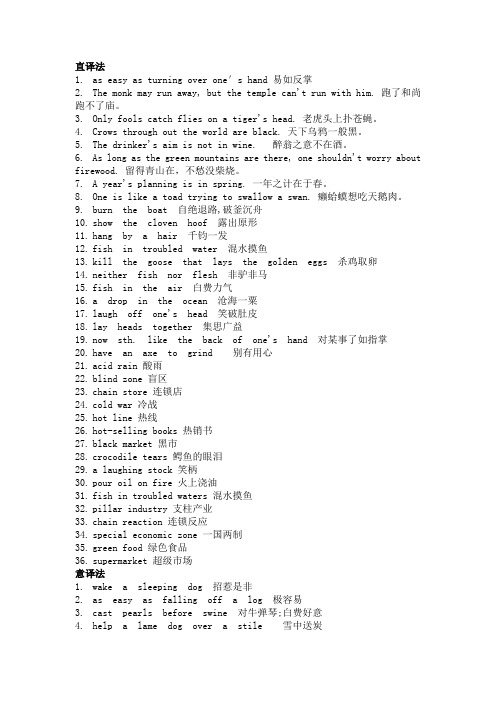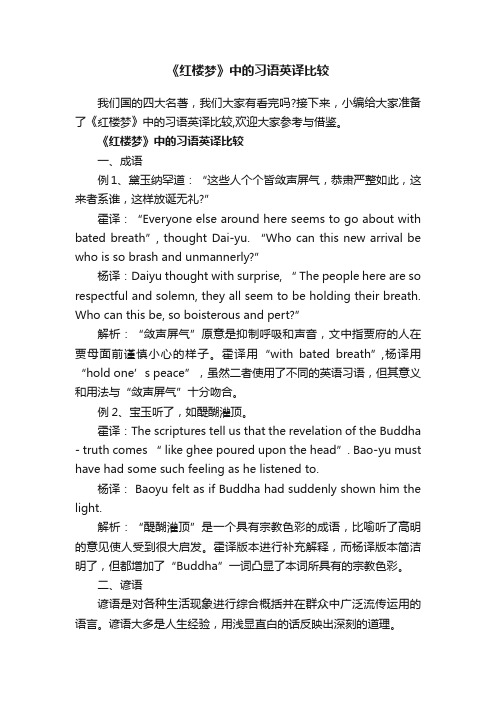红楼梦的习语翻译
常见习语(直译意译归化异化)

直译法1. as easy as turning over one's hand 易如反掌2. The monk may run away, but the temple can't run with him. 跑了和尚跑不了庙。
3. Only fools catch flies on a tiger's head. 老虎头上扑苍蝇。
4. Crows through out the world are black. 天下乌鸦一般黑。
5. The drinker's aim is not in wine. 醉翁之意不在酒。
6. As long as the green mountains are there, one shouldn't worry about firewood. 留得青山在,不愁没柴烧。
7. A year's planning is in spring. 一年之计在于春。
8. One is like a toad trying to swallow a swan. 癞蛤蟆想吃天鹅肉。
9. burn the boat 自绝退路,破釜沉舟10. show the cloven hoof 露出原形11. hang by a hair 千钧一发12. fish in troubled water 混水摸鱼13. kill the goose that lays the golden eggs 杀鸡取卵14. neither fish nor flesh 非驴非马15. fish in the air 白费力气16. a drop in the ocean 沧海一粟17. laugh off one's head 笑破肚皮18. lay heads together 集思广益19. now sth. like the back of one's hand 对某事了如指掌20. have an axe to grind 别有用心21. acid rain 酸雨22. blind zone 盲区23. chain store 连锁店24. cold war 冷战25. hot line 热线26. hot-selling books 热销书27. black market 黑市28. crocodile tears 鳄鱼的眼泪29. a laughing stock 笑柄30. pour oil on fire 火上浇油31. fish in troubled waters 混水摸鱼32. pillar industry 支柱产业33. chain reaction 连锁反应34. special economic zone 一国两制35. green food 绿色食品36. supermarket 超级市场意译法1. wake a sleeping dog 招惹是非2. as easy as falling off a log 极容易3. cast pearls before swine 对牛弹琴;白费好意4. help a lame dog over a stile 雪中送炭5. paint the lily 画蛇添足6. as poor as Job 家贫如洗7. a fly in the ointment 美中不足之处8. reap what one has sown 自食其果9. carry coals to Newcastle 多此一举;徒劳无功10. be all thumbs笨手笨脚11. eat no fish 忠诚12. as close as an oyster 守口如瓶13. let the cat out of the bag 漏出马脚14. love me, love my dog 爱屋及乌15. a flash in the pan 昙花一现16. to cry up wine and sell vinegar 挂羊头卖狗肉17. penny wise and pound foolish 捡了芝麻,丢了西瓜18. be no spring chicken 不再年轻19. that pathetic excuse for a human being 下三滥20. justice has long arms 天网恢恢,疏而不漏21.bull's eye 靶心22.dog house 高频高压电源屏幕罩23.cold wave 寒潮24.a black sheep 黑马25.black coffee 不加牛奶的咖啡26.a white lie 善意的谎言27.a baby kisser 政客28.Chinese dragon 麒麟29.China policy 对华政策30. money mad 向钱看31. cash crops 经济作物32. to look on with folded arms 袖手旁观33. all corners of the country 五湖四海34. to take advantage of every weakness 无孔不入归化法1. spring up like mushrooms 雨后春笋2. every dog has his day 凡人皆有得意日3. to keep one's head above water 奋力图存4. To live a dog's life 过着牛马不如的日子5. as poor as church mouse 穷的像叫花子6. A Jian Libao a day keeps the doctor away 要想体力好,常饮健力宝7. lucky dog只能译为“幸运儿”8. kill two birds with one stone 译为“一石二鸟”9. Good to the last drop.滴滴香浓,意犹未尽。
红楼梦的习语翻译

红楼梦〉是我国一部具有高度思想性、高度艺术性、足以夸耀于世界的古典文学巨著。
全书运用了大量极富表现力的口语、方言词语和文言词语以及有浓厚生活气息的成语、俗语、歇后语等,全面地描绘了封建社会中贵族家庭的兴衰,并且深刻地批判了封建社会的腐朽没落。
有人称颂〈红楼梦〉是一部“中国封建社会的百科全书”,又是一座“词语的宝库”,它是当之无愧的。
〈红楼梦〉的内容极其繁复。
它的包容量和涵盖面十分巨大,涉及的范围相当广泛。
它包括历史典故、词章知识、职官制度、戏曲情节、名人轶事、服饰、建筑名称、名物、习俗、以及诗词典赋、酒令灯谜、对联匾额等等,真是绚丽多彩,万象森罗。
〈红楼梦〉中的习语,大部分是〈红楼梦〉那时代所特有的、不同于现代;其方言词语,又具有地方特点;因此理解难度很大,其中不少习语在现代汉语词典中也难找到。
这就给国内外读者阅读汉语版〈红楼梦〉带来不便。
鉴于目前世界各地学习汉语之风渐入高潮,正是可以将我国伟大的古典文学巨著〈红楼梦〉介绍给国际友人学习、阅读的时机。
因此,编者初步尝试,编写了这部〈红楼梦汉英习语词典〉。
本词典是一部〈红楼梦〉专著双语工具书,共收〈红楼梦〉中词语2270余条,每条词语既有汉语详细解释,又有多种英语释义,均附有汉英对照的例句。
本词典所收词语以〈红〉书中四字组合的成语为主,兼收多字组合的普通词语、方言词语、俗语、谚语、歇后语等。
哀哀欲绝]悲哀到将要气绝的地步。
形容十分悲哀。
也作“哀痛俗绝”。
(绝:气绝 to stop breathing—die. )‖weeping as if one’s heart would break/ to mourn bitterly/ to grieve deeply for something as if to stop breathing[例](1)那宝珠按未嫁女之丧,在灵前……。
(13回)Then Baozhu mourned like an unmarried daughter ,weeping by the coffin as if her heart would break .(2) 这里命人将鸳鸯(尸体)放下,停放里间屋内。
汉英翻译技巧第12章 汉语习语的翻译

by Cao Xueqin
Excerpts from Chapter 5 Jia Bao-yu visits the Land of Illusion and the fairy Disenchantment performs the “Dream of Golden Days”
A Dream of Red Mansions
by Cao Xueqin
Excerpts from Chapter 5 Jia Bao-yu visits the Land of Illusion and the fairy Disenchantment performs the “Dream of Golden Days”
She has left her willow-tree house, from her blossoming bower stepped out; for the birds betray where she walks through the trees that cluster about, and a shadow athwart the winding walk announces that she is near, and a fragrance of musk and orchid from fluttering fairy sleeves, and a tinkle of girdle-gems that falls on the ear at each movement of her dress of lotus leaves. A peach-tree blossoms in her dimpling cheek; her cloud-coiled tresses are halcyon-sleek; and she reveals, through parted cherry lips, teeth like pomegranate pips. Her slim waist’s sinuous swaying calls to mind the dance of snowflakes with the waltzing wind; hair ornaments of pearl and halcyon blue Outshine her painted forehead’s golden hue. Her face, through blossoms fleetingly disclosed, to mirth or ire seems equally disposed; and as by the waterside she goes, hovering on light-stepping toes, a half-incipient look of pique says she would speak, yet would not speak; while her feet, with the same irresolution, would halt, yet would not interrupt their motion. I contemplate her rate complexion, ice-pure and lade-like in perfection; I marvel at her glittering dress, where art lends grace to sumptuousness; I wonder at her fine-cut featured—marble, which fragrance marks as one with living creatures; and I admire her queenly gait, like stately dance of simurgh with his mate. Her purity I can best show in plum-trees flowering in the snow; her chastity I shall recall in orchids white at first frost-fall; her tranquil nature will prevail, constant as lone pine in an empty vale; her loveliness as dazzled make as sunset gilding a pellucid lake; her glittering elegance I can compare with dragons in an ornamental mere; her dreamy soulfulness most seems like wintry waters in the moon’s cold beams. The beauties of days gone by her beauty are all abashed. Where was she born, and from whence descended? Immortal I judge her, fresh come from fairy feastings by the Jasper Pool, or from fluting in starry balls, some heavenly concert ended.
从译介学角度看《红楼梦》的习语英译

从译介学角度看《红楼梦》的习语英译作者:郭燕华吴彤赵鑫鑫来源:《商情》2020年第09期【摘要】习语是人们在长期的语言实践中提炼出的精华和结晶。
被称为中国文化百科全书的《红楼梦》不乏俗语、成语和俚语等习语。
这些习语简洁达意传神,承载着独特而强烈的民族文化特色,在刻画人物、烘托主题,和传递中国文化特色方面起了重要作用,为原著增色不少。
如何准确传达这些富含文化信息的习语是翻译的难点所在。
笔者试从译介学的角度,对杨宪益夫妇的译本中的部分习语英译进行分析,以探索译介学对习语翻译的启示。
【关键词】《红楼梦》 ;习语 ;英译 ;译介学一、引言语言是文化的载体,翻译即是两种文化的互相交流。
而文学翻译不仅要将源语所承载的信息转换到目的语中去,还应将源语所包含的文化信息呈现在目的语中。
《红楼梦》是中国古典小说发展的高峰,其文学成就迄今仍然无人能够超越。
这部文学巨著不仅为中国人民所喜爱,也是世界文学中的瑰宝。
被称为中国文化的百科全书的《红楼梦》,其中俗语、成语和俚语等习语比比皆是。
习语则是人们在长期的语言实践中提炼出的精华和结晶,承载着独特而强烈的民族文化特色,这些习语为原著增色不少。
《红楼梦》中的习语简洁达意传神,在刻画人物、烘托主题,和传递中国文化特色方面起了重要作用。
这些习语翻译得当与否,直接影响到译文质量及文化的传播。
因此如何使读者能理解原作品的意义同时吸收习语本身所蕴涵的文化内涵非常重要。
杨宪益夫妇的译作A Dream of Red Mansions (以下简称杨译本)被称作中西文化交流史上的一座里程碑,原著所融合的中国几千年的文化传统在其译作中得以较为忠实的再现。
笔者从译介学的角度,通过对杨宪益及夫人戴乃迭(Gladys. Yang)的《红楼梦》英译本中习语翻译稍做探讨,读者的视野会更为开阔,从而加深对这一习语翻译的理解和认知。
二、译介学概述译介学往往被混同于广泛意义上的翻译研究。
译介学是比较文学研究的一个分支,其实质是一种文学或文化研究,因为它并不局限于某些语言的理解与表达,也不参与评论其翻译质量的优劣,它把翻译文本作为一个既成的历史事实进行研究,把翻译过程以及翻译过程中涉及到的语言现象作为文学研究或文化研究。
以《红楼梦》中的习语翻译为例看关联理论下的习语翻译

以《红楼梦》中的习语翻译为例看关联理论下的习语翻译摘要:汉语习语由于其丰富的文化内涵, 一直以来都是翻译的难点问题之一。
较多的学者都是从文化研究的角度入手, 强调文化之间的差异。
但仅从文化入手, 仍然不能解决习语在具体语境的翻译问题。
文章尝试从关联翻译理论角度出发来研究汉语习语在语境中的具体翻译, 认为习语的翻译不仅要考虑文化因素, 还要充分考虑作者意图, 读者期盼, 以达到最佳关联, 并且希望能够从并且希望能够从《红楼梦》中的习语翻译总结一些指导习语翻译的方法。
关键词: 汉语习语关联理论直接翻译间接翻译汉语习语是中华民族在长期的使用过程中逐渐形成的固定短语或短句,由于产生于特定的历史文化背景下,汉语习语大多体现出汉语民族特有的历史地域、风俗习惯、宗教信仰、价值观念等文化信息,如果理解或使用不当,就会在交流中造成误解,导致交际失败。
汉语习语是汉语国家与非汉语国家沟通、理解、发展友谊的桥梁和纽带,是使世界各国人民了解中国文化的重要手段。
尽管国内外学者对习语的研究已有很多关注,但大部分学者只是集中在语言文化层面的研究。
而关联翻译理论则是从认知语用学的角度出发研究翻译活动,把翻译看成一种特殊的交际,认为成功的翻译应考虑原语作者的意图,目的语读者的语境与期盼等多方面的因素,从而实现最佳关联。
一、关联理论与翻译Dan Sperber和DEirdreWilson在对H.P.Grice关联原则研究的基础上于1986年出版的《关联:交际与认知》一书中提出了关联理论。
该理论极大影响了认知语用学的发展并被广泛运用于翻译、认知心理学、隐喻等各种交际活动中。
两位学者认为人类的交际是一种明示—推理过程。
人们之间的交际之所以能够成功是因为有一个最佳的认知模式—关联。
关联性的强弱由语境效果和处理努力两个关键因素决定。
在同等条件下,语境效果越大,关联性越强;处理努力越大,关联性则越弱。
他们在书中提出了关联原则,认为关联原则实际由两条原则组成,即认知原则(第一原则)和交际原则(第二原则)。
红楼梦英译本赏析

习语的翻译
• (1)3黛玉纳罕道:“ 这些人个个皆敛声屏气, 恭肃严 整如此, 这来者系谁, 这样放诞无礼?”(曹雪芹 2007 :33) 霍译:`Everyone else around here seems to go a-
bout with bated breath ' , thought Dai-yu .`Who can this new arrival be who is so brash and unmannerly ?' (Hawkes &Minford 1973 (v ol .1):90-91)
都用直译的方法解释了原文,而汉语和英语都 可以用樱桃来形容嘴唇。
• 《红楼梦》第六十五回形容尤 三姐嘴唇是“檀口点丹砂”。 “檀”是一种浅红色或浅绛色 的颜料,在古代常被女子用作 口红,所以“檀口”便成了描 写女性浅红色嘴唇的一个专用 语。丹砂,也叫朱砂,是古代 中国妇女最早的口红。
• “檀口点丹砂”杨译为“her fragrant lips glowed red as cinnabar”不仅把嘴唇的“红”
和涂嘴唇的颜料“朱砂”译出,还用 “fragrant lips glowed”尽译出嘴唇化妆后的
香艳和色泽,向读者传达了东方审美标准。 霍译本译为“lips incarnadine”,仅用 “incarnadine”翻译略显简单,没有原文极 尽修饰嘴唇香艳之意,但译者为适 应西方
文化,这种简化也是一种可取之道。
《红楼梦》英译本评析 The Evaluation of A Dream
of Red Mansions
• 一、从归化和异化分析 • 二、外貌类形容词语翻译 • 三、习语的翻译
从归化和异化的角度
• 例.“巧媳妇做不出无米的饭来”,叫我怎么样 呢?(《红楼梦》第二十四回)
_红楼梦_中的习语及其翻译研究

2008年11月第40卷 第6期外语教学与研究(外国语文双月刊)Foreign L a nguage Teaching a nd Research (bimont hly )N ov.2008V ol.40N o.6《红楼梦》中的习语及其翻译研究3燕山大学 刘泽权 朱 虹 提要:本文通过分析中国古典名著《红楼梦》前56回中的习语及其在三个英译本中的翻译,探讨原文习语在译文中的再现情况。
基于前人对汉英习语研究的成果,本文将汉语习语界定为四字成语、惯用语、谚语和歇后语,借助语料库工具Para Conc 检索出原文习语及其在三个英译本中的翻译。
通过比较三个英译本在再现原文习语方面的异同与得失,本文探讨各译者在处理这些习语时的规律性策略,为典籍的习语翻译研究及汉英翻译教学与实践提供借鉴。
关键词:《红楼梦》、习语、语料库、翻译 [中图分类号]H315.9 [文献标识码]A [文章编号]100020429(2008)0620460207一、引言习语是人类智慧的结晶、语言的精华,具有很强的表现力。
任何一部成功的文学作品,都以其作为重要的语言表现手段,中国古典名著《红楼梦》也不例外。
可以说,“《红楼梦》在语言艺术上获得巨大成功的原因之一,就是使用了丰富多彩的习语”(韩忠华1986:289),“整部《红楼梦》从头到尾俯拾皆是大量的成语、俗语、谚语、歇后语、粗俗语等”(张培基1980:1)。
《红楼梦》已被国内外学者译成20多种语言,其中英译本有10余种,最早的是1892至1893年在香港出版的、前英国驻澳门副领事乔利(Bencraf t J oly )翻译的二卷本《红楼梦》(前56回)(以下简称乔译),另外两本影响较大的是中国翻译家杨宪益与其英国夫人戴乃迭(Gladys Ya ng )合译的120回《红楼梦》(以下简称杨译)和英国汉学家霍克斯(David Haw kes )及其婿J ohnMinf ord 翻译的120回《红楼梦》(以下简称霍译)。
《红楼梦》中的习语英译比较

《红楼梦》中的习语英译比较我们国的四大名著,我们大家有看完吗?接下来,小编给大家准备了《红楼梦》中的习语英译比较,欢迎大家参考与借鉴。
《红楼梦》中的习语英译比较一、成语例1、黛玉纳罕道:“这些人个个皆敛声屏气,恭肃严整如此,这来者系谁,这样放诞无礼?”霍译:“Everyone else around here seems to go about with bated breath”, thought Dai-yu. “Who can this new arrival be who is so brash and unmannerly?”杨译:Daiyu thought with surprise, “ The people here are so respectful and solemn, they all seem to be holding their breath. Who can this be, so boisterous and pert?”解析:“敛声屏气”原意是抑制呼吸和声音,文中指贾府的人在贾母面前谨慎小心的样子。
霍译用“with bated breath”,杨译用“hold one’s peace”,虽然二者使用了不同的英语习语,但其意义和用法与“敛声屏气”十分吻合。
例2、宝玉听了,如醍醐灌顶。
霍译:The scriptures tell us that the revelation of the Buddha - truth comes “ like ghee poured upon the head”. Bao-yu must have had some such feeling as he listened to.杨译: Baoyu felt as if Buddha had suddenly shown him the light.解析:“醍醐灌顶”是一个具有宗教色彩的成语,比喻听了高明的意见使人受到很大启发。
- 1、下载文档前请自行甄别文档内容的完整性,平台不提供额外的编辑、内容补充、找答案等附加服务。
- 2、"仅部分预览"的文档,不可在线预览部分如存在完整性等问题,可反馈申请退款(可完整预览的文档不适用该条件!)。
- 3、如文档侵犯您的权益,请联系客服反馈,我们会尽快为您处理(人工客服工作时间:9:00-18:30)。
红楼梦〉是我国一部具有高度思想性、高度艺术性、足以夸耀于世界的古典文学巨著。
全书运用了大量极富表现力的口语、方言词语和文言词语以及有浓厚生活气息的成语、俗语、歇后语等,全面地描绘了封建社会中贵族家庭的兴衰,并且深刻地批判了封建社会的腐朽没落。
有人称颂〈红楼梦〉是一部“中国封建社会的百科全书”,又是一座“词语的宝库”,它是当之无愧的。
〈红楼梦〉的内容极其繁复。
它的包容量和涵盖面十分巨大,涉及的范围相当广泛。
它包括历史典故、词章知识、职官制度、戏曲情节、名人轶事、服饰、建筑名称、名物、习俗、以及诗词典赋、酒令灯谜、对联匾额等等,真是绚丽多彩,万象森罗。
〈红楼梦〉中的习语,大部分是〈红楼梦〉那时代所特有的、不同于现代;其方言词语,又具有地方特点;因此理解难度很大,其中不少习语在现代汉语词典中也难找到。
这就给国内外读者阅读汉语版〈红楼梦〉带来不便。
鉴于目前世界各地学习汉语之风渐入高潮,正是可以将我国伟大的古典文学巨著〈红楼梦〉介绍给国际友人学习、阅读的时机。
因此,编者初步尝试,编写了这部〈红楼梦汉英习语词典〉。
本词典是一部〈红楼梦〉专著双语工具书,共收〈红楼梦〉中词语2270余条,每条词语既有汉语详细解释,又有多种英语释义,均附有汉英对照的例句。
本词典所收词语以〈红〉书中四字组合的成语为主,兼收多字组合的普通词语、方言词语、俗语、谚语、歇后语等。
哀哀欲绝]悲哀到将要气绝的地步。
形容十分悲哀。
也作“哀痛俗绝”。
(绝:气绝 to stop breathing—die. )‖weeping as if one’s heart would break/ to mourn bitterly/ to grieve deeply for something as if to stop breathing[例](1)那宝珠按未嫁女之丧,在灵前……。
(13回)Then Baozhu mourned like an unmarried daughter ,weeping by the coffin as if her heart would break .(2) 这里命人将鸳鸯(尸体)放下,停放里间屋内。
平儿也就知道了,过来同袭人莺儿等一干人都哭的……。
(111回)While orders were given to cut down Y uan’scorpse and lay it out in the inner room .Word of this brought Ping’er , Xiren , Ying’erand the other maids to the scene ,where they mourned bitterly.挨肩擦脸]肩挨着肩,脸贴着脸。
形容两人靠得很近。
(挨:靠近 to be close to.擦:贴近 to nestle up against. )‖to sit ( or stand ) shoulder to shoulder and cheek to cheek/ to be sitting very close to each other/ to nesle up to each other.[例] 贾珍便和三姐~,百般轻薄起来。
小丫头子们看不过,也都躲了出去,凭他俩个自在取乐,不知作些什么勾当。
(65回)Then Jia Zhen and Third Sister nestled up to each other and flirted so outrageously that the maids were shocked and slipped out , leaving them to amuse themselves however they pleased唉声叹气]因伤感、忧闷或悲痛而发出叹息的声音。
也作“嗐声叹气”、“嗳声叹气”。
‖to be moaning and groaning/ to sigh in despair ( or in grief )/ to heave a sigh/ to sigh and moan/ to heave great ( or deep ) sighs[例] (1)(你)既出来了,全无一点慷慨挥洒谈吐,仍是葳葳蕤蕤。
我看你脸上一团思欲愁闷气色,这会子又~。
你那些还不足,还不自在?(33回)When you did come , you had nothing spiritedor cheerful to say but looked quite down in the mouth ,the picture of gloom . And now you’re sighing again .What have you to moan about ? Is anything wrong ?(2)薛蟠(对金桂)急得说又不好,劝又不好,央告又不好,只是出入~,抱怨说运气不好。
(80回)Xue Pan was too frantic to know what to do—remonstrate ,reason and plead with her , or beat her .He stumped in and out of the room ,sighing and fuming , cursing his own bad luck .(3)那媳妇~,口不敢言,抱恨而去。
(52回)The woman sighed in despair and too cowed say another word ,went off in high indignation .挨打受骂]指受人打骂或虐待。
也作“挨打受气”。
‖to suffer beating and receive ( or endure ) scoldings/ to put up with blows and scoldings/ to be beaten and cursed/ to be bullied and beaten[例] 人家的奴才跟主子赚些好体面,我们这等奴才白陪着~的。
(9回)Other people’s slaves get some reflested credit from their masters .All we for waiting on you is beating and abuse[挨冻受饿]指无衣无食的困苦生活。
也作“挨饿受冻”。
‖to suffer from cold and hunger/ to suffer hunger and cold/ to endure cold and hunger/ to go cold and hunger[例] 妈妈若是疼我,听我的话,有年纪的人,自己保重些。
妈妈这一辈子,想来还不致~。
(100回)If you are fond of me ,mother , take my advice and now that you are old take better care of your health .I can’t believe you will ever go cold and hungry[矮墙浅屋]墙不高,屋子不大。
意思强调家时发生的事很容易被外人知道。
‖The wall is low and the house small—famillscandals may be easily spread ./ The walls are thin—the disgrace of a familyis easily heard by outsiders .[例] 薛姨妈道:“你们是怎么着,又这样翻宅乱起来。
这还像个家儿吗?~的,难道不怕亲戚们听了笑话了么。
”(83回)“ What are you doing ? ” cried Aunt Xue .“ Turning the house upside—down again !What way is this to behave ? The walls are so thin ,a ren’t you afraid our relativesmay hear and laugh at you ? ”[爱八哥儿]原指可爱的东西。
常用作反语,讽刺被宠爱的人。
也作“爱不够儿”。
‖the pet/ the slut[例] 我和他(尤二姐)“井水不犯河水”,怎么就冲了他!好个~,在外头什么人不见,偏来了就有人冲了。
(69回)I kept as clear of her as well water and river water .How could my horoscope clash with hers ?She had all sorts of contacts outside ,the slut . Why does the jinx have to be found gere ?喜爱的就像对待珍宝一样。
也作“爱之如宝”。
‖to love as if it were a gem or a pearl/ to love somebody dearly[例] (1)(林如海)今只有嫡妻贾氏,生得一女,乳名黛玉,年方五岁。
夫妻无子,故~。
(2回)By his wife , nee Jia ,Lin Ruhai had a daughter Daiyu just five years old .Having not a son both parents loved her dearly .(2)子兴冷笑道:“万人皆如此说,因而乃祖母(对宝玉)便先~。
(2回)”Zixing smiled cynically , “That’s what everyone says .And for that reason his gtandmother loveshim as if he weve a gem or a pearl . ”碍手碍脚]妨碍别人做事。
(碍:妨碍 to obstruct . )‖to be obstructed by one’s hands and feet—to bein such a position or of such a nature as tocause inconvenience/ to sand ( or be ) in the way/ to be a hindrance[例] 宝钗因说道:“咱们别在这里~,找探(春)丫头去,”说着,和宝玉黛玉等便往迎春房里来闲玩。
(18回)So Baochai suggested ,“Let’s not stay here where we’re only in the way . Let’s go and find Tanchun . ”She took Baoyu and Daiyu to the roomof Yingchun and others to while away the tim安邦定国]使国家安定、巩固,免于动乱。
